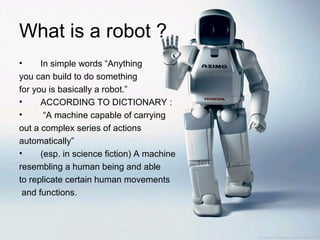The term robot comes from the czech word robota meaning forced labor

The Origin of the Term “Robot”: A Surprising Fact about Tech

When we think of robots, images of advanced machines performing various tasks often come to mind. But have you ever wondered where the term “robot” actually comes from? Surprisingly, it has its roots in the Czech language.
The Czech Word “Robota”
The term “robot” originates from the Czech word “robota,” which means “forced labor.” It was first introduced by Czech writer Karel Čapek in his play “R.U.R.” (Rossum’s Universal Robots) in 1920. Čapek used this term to describe artificial workers created to serve humans.
The Connection to Forced Labor
In the early 20th century, forced labor was a prevalent issue, and the concept of mechanical beings performing laborious tasks resonated with many. The term “robot” captured the essence of this idea and quickly gained popularity.
The Rise of Robots in Popular Culture

Following the introduction of the term “robot,” it began to appear in various works of literature, movies, and other forms of popular culture. As technology advanced, so did the portrayal of robots in these mediums.
Robots became symbols of innovation, automation, and the potential for overcoming human limitations. They captured the imagination of people worldwide and continue to do so to this day.
Impact on Technological Advancements
The term “robot” has become synonymous with automation and artificial intelligence. Today, robots are not just a concept in science fiction but a tangible reality in various industries.
From manufacturing and healthcare to space exploration and everyday household chores, robots have revolutionized the way we work and live. They have significantly contributed to increasing efficiency, improving productivity, and enhancing our capabilities.
Conclusion
The term “robot” may have originated from the Czech word “robota,” meaning “forced labor,” but its significance has transcended its initial meaning. It has become an integral part of our modern world, representing the boundless possibilities of technology.
Sources: Pocket-lint
Share
Related Posts
Quick Links
Legal Stuff

